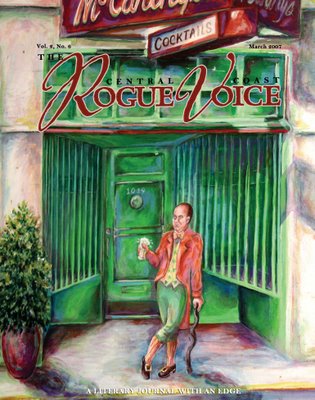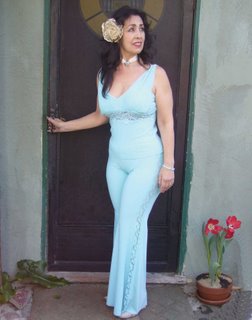 Who ever heard of a bug you can’t see? It had to be a Texas myth. I locate the pinching pain and watch as a slight pinkish bump emerges then blooms into a red dot. The itching comes on fiercely and I oblige it with my nails. I was no longer in denial about the noseeums.
Who ever heard of a bug you can’t see? It had to be a Texas myth. I locate the pinching pain and watch as a slight pinkish bump emerges then blooms into a red dot. The itching comes on fiercely and I oblige it with my nails. I was no longer in denial about the noseeums.
Photo illustration by Stacey Warde
Noseeum mayhem in an Austin downpour
(episode 18)
By Ben Leroux
THURSDAY
The October drizzle in Cedar Park, Texas, begins so harmlessly that I, and the furniture storeowner whose windows I clean, shrug it off.
While she is outside paying me, I reach down and scratch at three pin-sized lesions I’d been working on for a few days. They itched like crazy. I show them to her and ask her what they might be about.
“They might be fleas,” she says examining my sandaled feet. “Or mites of some kind–chiggers possibly. Have you checked for fleas?”
“I know what a flea looks like,” I tell her. “And I haven’t seen any fleas in my car. These are different from fleabites, though I admit there are similarities.”
“Uh-oh,” she says.
“What?”
“It might be noseeums.”
The drizzle picks up and I look out into the parking lot where the Plymouth’s windows are down. I take my money and run through the heavy gray mist.
“Noseeums, you say?” I yell from the Plymouth.
“Yes,” she yells. “A noseeum is a bug you cain’t see!”
It’s a 10-minute drive into Austin. I was looking forward to Austin. It was supposed to be a Texas oasis of diversity and liberalism filled with freethinking, pot-smoking musicians and college students. Though I couldn’t complain about the syrupy politeness of the Texas panhandle, it had, like syrup does, gotten sticky.
Just inside the Austin city limits, the drizzle becomes a warm slashing rain, and fog spreads across the inside of the windows, making the only thing visible a Target parking lot to my left. For refuge, I turn in. Inside, the air is cool and dry and there’s a Starbuck’s.
Paying for coffee, I reach down to scratch my bites, leaving red tracks flaring from the bloody little specks. I count five now–two on the right foot, one on the right ankle, and two more on the left shin.
“Are you familiar with the noseeums?” I ask the barista. “I’m not from around here.”
“Where’re you from?” she asks.
“California.” I reach down for another irresistible clawing.
“Just a minute.” She waits on the next person in line.
I take my coffee out to a table. I figure I’ll sit down and make my window-washing plans for when the rain cleared, which should be any minute. My experience in Texas had been that rain never lasted long.
The barista comes out and heads directly for my table.
“Seriously, have you ever heard of these things?” I say, tearing at the misery once more.
“Did you know Houston is the dirtiest city in the United States?” she says. “The whole yew-ni-ted-states.” She looks nauseated. “It’s his own damn city, you know.”
“Whose?” I say, groaning and raking and digging in between sips.
“Whose do you think? Our so-called president. I don’t even like to say his name, I hate ‘im so much.” She leaves me and waits on another customer.
I drink quickly, wondering why she had come on to me so strong about Bush then remember I had mentioned California.
“Can you tell me how he lets his own city become the filthiest in the country? Can you tell me that?” She is standing over me again.
I don’t have an answer for her. I mainly wanted to know about the noseeums. She walks away in a dudgeon.
The itching starts to abate as I finish my coffee. I head for the door, expecting clear skies. There was still time to go deeper into Austin, make some money, eat Texas chili, then find some live music to listen to, Austin being the live music capital of the world.
But when the automatic doors slide open, a scalding gust of wet air is there. The rain has become a hot, tropical downpour and the asphalt hisses with a rising white vapor. I spot the Plymouth out at the far edge of the parking lot, and make a run for it.
Out in the Plymouth I lay back and try to dry off while counting the minutes and window-washing dollars tick away. Even though it was early afternoon, I could still probably make about 80 dollars once I got into the city.
The rain though never lets up.
Instead, it steadies throughout the afternoon and evening and builds with a doom that seeps into every pore of Austin.
More troubling, additional bites surface every hour or so—angry red dots in various stages of mayhem. At times I try to inspect the foot of my bedding for fleas, chiggers, or mites, but such efforts result only in profuse perspiration. It’s better to just lay back, let the things eat away, and hope for a breeze.
FRIDAY
I rise into a flood of my own sweat, as the nonstop downpour hammers the Plymouth and drowns the Target parking lot. The air is hotter and danker than yesterday. I give the bites a vigorous scratching. There are new ripe ones. The old ones are open sores now. I have a good set on both legs–six or more on each, trios on each forearm, and a single one on the back of the right hand.
I feel a nibble coming on, and bring my ankle up to my eyes. I hold it there in a yoga posture and observe. Who ever heard of a bug you can’t see? It had to be a Texas myth. I locate the pinching pain and watch as a slight pinkish bump emerges then blooms into a red dot. The itching comes on fiercely and I oblige it with my nails. I was no longer in denial about the noseeums.
There’s some clatter outside, so I wipe away a looking-hole on the fogged glass.
A few feet away, over a salvo of manic curses, a Target employee fights with a stream of shopping carts. This far out, he probably thinks he is alone. He obviously doesn’t know anyone is in the old fogged-up Plymouth.
Violently, this kid, who looks about 17, tries to force stubborn carts into the back ends of others. If he just lined them up, he could probably slide them in, but it is clear he hates the carts and that his foremost intentions toward them are abusive.
For the next five minutes I watch the kid do battle with the plastic-metal carts. Between half-hearted attempts to fit them together, he heinously batters them. He turns them on their sides and kicks them. He jumps atop them and drives his heels into them. He sends them hydroplaning through dirty puddles toward curbs where they jump over into grassy sloughs. Ankle-deep in murk, he rescues them. I get a good look at the kid. He has uneasy dark eyes covered by wet, black bangs. The nametag under his clear poncho says KYLE. Kyle’s not like the other kids in Texas.
He continues the beating. He rams the carts into steel poles at different angles. He does all this with a flat, malicious grin. He laughs at the scorching rain that fires into his eyes and mouth. He stops only when he hears the creak of the Plymouth drivers-side door.
“What’s up?” I say, standing outside the Plymouth. I nod at him.
Kyle’s black eyes glare me down. He lifts his upper lip in a hateful snarl. I look away and walk widely around him on my way to the store.
The bites cool as I walk the aisles of Target. I try to forget about the rain, the bites, the weekend ahead. I wonder about Kyle. I kind of liked him. His hatred for the carts was inspiring. He probably also hated his job, and conformity in general. If his relationship with the carts was any indication, he might actually go through life as an individual. He probably wouldn’t make it through the week at Target though.
When I get back outside, Kyle is under the storefront shelter with a supervisor. The supervisor has a hand on Kyle’s shoulder, and is counseling him. Kyle hides his eyes under his dripping bangs and looks down. Surely he is being fired.
But no, Kyle’s been given another chance. He sprints out ahead of me and into the rain and with civility, begins gathering carts. The supervisor stands under the shelter, arms folded, watching.
SATURDAY
The rain continues to bludgeon Austin, or at least the square quarter-mile of gray, wet muddlement nature had sequestered me to. It’s while exploring this area, venturing blindly across the highway, that I find a Barnes & Noble bookstore. It’s a serendipitous discovery to say the least–a place I can now lounge around in reading and forgetting about my thinning pockets and my impending starvation if the rain doesn’t quit soon. But it’s also where I make a grim mistake.
I pick up a magazine from a coffee table. I read a couple pages. Some futuristic foolishness about how robotics will soon be making our human lives easier, safer, and healthier, along with warnings that we were becoming overly dependent on technology. It was your basic science-geek reading material.
I guess I read a little too much. I guess I look at one too many photos. I don’t know what happens, but I get carried away. I find myself amongst the geeks and nerds, ransacking the aisles of Science and Technology, in the throes of something resembling an anxiety attack.
Near closing time, I stand inside the front door of Barnes & Noble and look out. I look out into the black rain, searching for the Plymouth, searching for a perspective, trying to climb out of a canyon of existential despair. The future looked bad. The reading had gotten to me.
Outside, the obtuse darkness pelts me with savage gushes of steamy Texas rain–the hardest yet.
I find that I’ve left the front passenger window down. The carpet and the foot of the bed are sodden marshes now. For the noseeums, who evidently thrived in such conditions, it was something to be happy about–it was their day again.
SUNDAY
You couldn’t really predict that one day we’d become robots, because that one day was already here. It was already in motion. There were already artificial limbs and organs, and there was cosmetic surgery. It was already possible to move human limbs with computer keystrokes, and to manipulate computers with human thought. Observed as a species, we behaved and consumed tastelessly and robotically, with communication devices affixed to the ears and thumbs. Soon there would be a chip in the iris or the skull to take their place. Something like the Internet would be on that chip. They say the change is coming on so rapidly that we won’t survive it. It seems we’ve done ourselves in with our hard-on for immortality. We’ve fucked ourselves, basically. I can’t say I’m sad about it, just disappointed that we will go down to the robots. I always thought we’d go down in some fiery cataclysmic blaze.
In the steamy Plymouth I sit and picture our last days. I’m too depressed to go back to Barnes & Noble, though I know I will later on.
I try for a nap. But with the sluggish humidity, it is a waste of time. I have a jar of dill pickles, some slices of processed cheese, and packets of Burger King ranch dressing.
I wrap a cheese slice around a pickle and squirt ranch dressing onto it. It’s not so bad, but I’m down to about three pickles, so I ration, and lay back with my shirt off, eating, and watching the constellations of stinging red beacons spread across the forelegs.
They have a nice home now, the noseeums. The swamp at foot of the bed will be there for a while. Warmth and moisture and blood appear to be the ideal environment for their breeding and gnashing.
Desperate for cool air, I get out and head for Target. Maybe I hadn’t looked down all the aisles. Maybe there were some things I could look at longer, like candles or fishing gear or stereos or office supplies or bathroom fixtures or party favors. I wonder if Target security is suspicious about me.
I spot Kyle up near the front. He is going apeshit on another shopping cart. He is whirling it in circles like an Olympic hammer-thrower. When he gets a good circular force up, he releases it and watches it skid across the slimy asphalt. He does this dangerously close to cars and I can’t help but think that today is Kyle’s last day at Target. Kyle could not be reformed.
With a twinkle in his eyes, Kyle watches the cars dodge him and rush swiftly away.
One of the carts slides to a halt in front of a moving car and the driver lays on the horn, waiting for Kyle to come clear the way. Kyle goes and stands next to his slain cart and faces the driver. He sticks his neck out in a challenging gesture and waits for the driver to make the next move.
MONDAY
As the rain continues to saturate Austin, I move on to advanced books on the future. I’m looking for a silver lining to the uprising of robots and the demise of us humans as we and they become one.
There’s the photo of the mutant with wires coursing through his translucent goldfish-orange skull. The wires look chillingly similar human veins. There’s the chrome-plated robot constructing its own human face using human tools. Next are miniature computers the size of dust mites–tiny noseeums of computers, if you will, capable of floating invisibly in clouds and monitoring the whereabouts of anything anywhere anytime.
Book after book, I search for a good ending—a “but.” But there were no “buts,” as far as I could tell. It all makes me want to go back to the sweltering Plymouth.
Then some life. A young coed in a burnt orange Texas Longhorn T-shirt and blue jeans takes the chair beside me and drops an armload of 20 fashion magazines on the floor. She slips off her flip-flops and tucks her legs under her butt. She has cute nubby brown toes with hot-pink nails. With each page she turns, she sends me whiffs of her perfume and the sweet, grape bubble gum she chews.
She scans through the stack in about 15 minutes, slips back on the flip-flops, smiles at me, and leaves. I look at her pile of used magazines and scratch my bites.
TUESDAY
Feeling catatonic. A possible breakdown. Hard to breathe. Days spent transporting myself and the noseeums from Target to Barnes & Noble and back. The rain bombards now in big sloppy, schizophrenic cupfulls. Rolled-up windows are suicide. I lay back and let the water splatter me and the inside of the Plymouth. I have no feelings about it. In a few minutes I’ll drive to the highway, point the Plymouth toward Barnes & Noble, wait until I think there’s no cars coming, and gun it into the gray and hope I make it.
WEDNESDAY
The last of the pickle-cheese wraps are gone. They are also good with ketchup or taco sauce. I’m now officially out of non-perishables but I have 60 cents left.
It’s also been two days since I’ve seen Kyle. He’s been fired, I’m sure. Congratulations, Kyle. Use the time wisely. Read Bukowski, smoke weed, sit under a tree and write poetry, fuck girls, buy a squeegee or a paint-roller or a lawnmower or something–but never ever come back to this fucking Target.
I wish I’d been more like you when I was your age. But they got to me early, hooked me into the machine. It wasn’t until my thirties that the bullshit started to clear. There’s hope for you though, Kyle. There’s hope.
THURSDAY
Delirium. A bag of potato chips (sour cream and onion). Rain constant. Bad Dreams. Trying to find enough breath to sleep. So what if I couldn’t? I wonder if Willie Nelson is performing in Austin.
As far as the passing of man into robot, it was starting to make perfect evolutionary sense to me. All any creature wanted was to live forever, and soon we would. Souls and nerves replaced with chips and wires. No more angst, no more delusions of afterlife. A technological rapture would be our salvation. Even the noseeums wanted their turn on the ladder. Look how ferociously they ate and multiplied–getting stronger, bigger, shooting for the top. Why shouldn’t they?
FRIDAY
I wake with an unexplained inner peace, though nothing about the weather had changed, and the noseeums nibbled away like never before. I guess I’d accepted them as hungry little traveling companions. I’m not sweating, and the grumbling in my stomach is gone. I sit for a couple hours in sublime tranquility. Maybe it would all end here at the Austin Target.
What snaps me out of it is a warm breeze that’s been blowing through the Plymouth for some time, and the absence of the sound of falling rain.
I get out into the sauna-like conditions and shake out my soggy bedding. Except for my returning hunger, and a need to urinate, the ordeal was over. I make one last hike toward Target.
Up ahead I see Kyle. His supervisor is showing him how to work a remote control for a contraption on wheels that fits into the back of the line of shopping carts.
As the short black box chugs the carts along, Kyle runs up ahead and guides them toward the front door.
“Like this?” I hear him say to his supervisor, his face bright with a ghostly luster. His bangs are shorter.
“Yes, that’s it,” says his supervisor. “That’s the way, Kyle.”
At the front door, Kyle looks up from his carts and smiles at me, and with clear eyes and pure white teeth says: “Good morning sir, welcome to Target.” §
Ben Leroux writes from a motel room in Morro Bay, and still plies his trade as a window washer. He can be reached by email at ben@roguevoice.com. Read more of his "Washing Windows Across America" series here:
Evicted From Wal-Mart (episode 9)Santa Fe Pride (episode 10)Leaving Las Vegas (episode 11)Tucumcari: End of the mother road (episode 12)Clovis ain't Texas (episode13)Welcome to Muleshoe (episode 14)Dry times in Lubbock (episode 15)Zen and the art of messing with Texas (episode 16)Directions from Texas (episode 17)
Go to the main page for this month's Rogue Voice
Read more!









